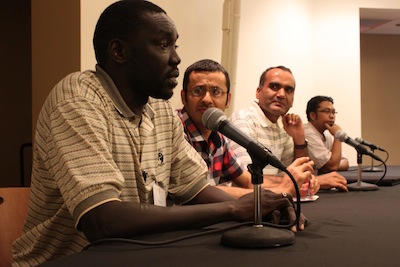By Sarah Williamson | gargoyle@flagler.edu
Photo by Tracey Eaton
“You have to eat another human being to survive. It’s sad. I don’t like to talk about it…we fled for our lives just to have life,” Nhial Kou shared with Flagler College students Oct. 18, on Refugee Awareness Day.
Kou, along with three other refugees, visited the college and shared their unique stories of survival. They are part of a select group. Only 1% of the world’s refugees have a chance to relocate, according to World Relief Jacksonville.
“I came to this country for one: life,” Kou said, “and two: safety.”
Kou left Sudan in the late 1980’s after the government continuously bombed his village. “They were killing us because we don’t believe what they believe. The whole city fled,” Kou said.
Kou ended up in Cairo at a refugee camp. He described bags of food being dropped in the bushes, provided by the United Nations. They displayed the words “United States.” At that time, Kou was unaware it was even a country.
Little did he know, he’d find his way to Jacksonville, Fla.
On the flight to John F. Kennedy International Airport in New York, Kou had one thing on his mind: where am I going? His confusion began when he left Cairo on a Thursday and arrived in New York on a Thursday. Kou had always thought the world ran on the same time schedule.
“We thought that when it was night, it was night everywhere. And when it was day, it was day everywhere,” Kou said.
Exiting the plane in Jacksonville, he was welcomed by volunteers holding American flags and flowers. It was those first moments that made all the difference.
After being denied life in his own country, “We felt like a human again,” Kou said.
Another speaker, Siamand Ando, is a refugee from Iraq. He was a professor of Sociology that was forced to leave his country after teaching his students about human rights. He arrived in Jacksonville with the same insecurities as Kou.
“Doesn’t matter who you are, degrees you have—you have nothing,” Ando said.
Although refugees are safe once they enter the United States, their plight doesn’t end there.
Most refugees have lived in camps for years. Most do not speak English. Some have never had access to electricity and running water. The whole process of resettlement is a delicate one.
As soon as they leave the airport—which is generally after midnight—refugees are plopped into housing where volunteers quickly begin to help them settle. This process can last until three in the morning. Orientation begins the next day, where they are medically tested, enrolled into resettlement programs and begin the process of getting a social security card.
Finding a job is next.
“They pay their way to get here, the government doesn’t buy their plane tickets. They take out loans,” Michelle Karolak, the Refugee Resettlement Director of Catholic Charities, said.
Kou and Ando are only two of nearly 1,000 refugees that enter Jacksonville per year. Cuba is the home country for most, however many come from Haiti, Burma, Colombia, Iraq, Bhutan and Venezuela.
Kou shared with the audience typical refugee struggles. The first is communication.
“People say what’s up? We look up. I ask my teacher, what’s wrong with people here?” Kou said, “They say, ‘what’s up’, I look up and see nothing!”
The second is directions.
After months of taking the bus to work, Kou and his friend finally saved enough money for a car. Problem was, they had no idea how to get there. They decided to follow the bus route they knew so well.
“The bus moved forward, we moved forward. The bus stopped, we stopped,” Kou said smiling.
The bus driver grew uneasy and called the police. Kou and his friend explained to the officer they were only trying to get to work. The officer laughed hysterically and escorted them himself.
It was moments like this—beginning with the flowers at the airport—where humanity crept through and Kou began to feel at home.
For more information about World Relief Jacksonville visit: http://worldreliefjacksonville.org/



Be the first to comment on "Refugees share stories of survival"